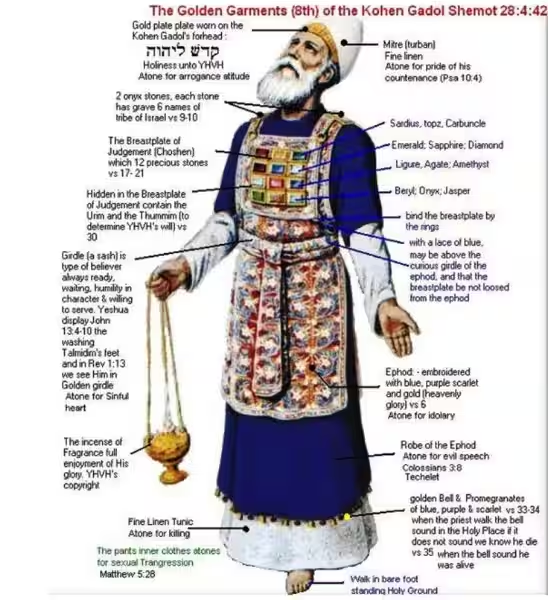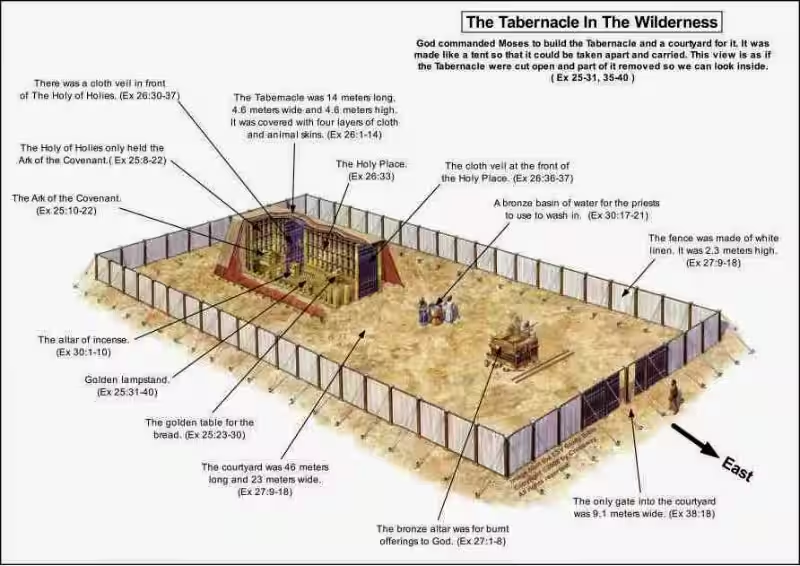Is God a God of Details? Unveiling the Significance of Divine Precision

Katie Westenberg's insightful reflection on Exodus 25:9, "You must make it according to all that I show you—the pattern of the tabernacle as well as the pattern of all its furnishings," unveils a profound truth often overlooked: God's meticulous attention to detail. This seemingly simple verse unlocks a window into a divine nature deeply involved in every aspect of creation, a "God of details" who cares not just for the grand narratives of history but also for the seemingly insignificant details of our daily lives.
Beyond the Storybook: The Meticulous Instructions of Exodus
The early chapters of Exodus captivate us with their dramatic narratives: the plagues, the parting of the Red Sea, the journey through the wilderness. Yet, the latter half, filled with detailed instructions for the construction of the tabernacle, is often perceived as tedious and less engaging. Westenberg's interpretation challenges this perception, highlighting the significance of God's precise specifications – the type of thread, the number of loops, the exact dimensions. These weren't arbitrary rules; they were a demonstration of a God intimately involved in every aspect of His people's lives, a God who values precision and doesn't leave anything to chance.
This detailed approach wasn't just about building a building; it was about establishing a sacred space, a place of encounter between God and His people. The meticulous instructions reflect the gravity of the relationship and the importance of honoring God in every aspect of its creation. This serves as a powerful metaphor for how God approaches all aspects of His creation, from the grand to the minute.
The “God of Details” in Everyday Life
Westenberg’s reflection extends beyond the historical context of the tabernacle. She suggests that just as God provided precise blueprints for the tabernacle, He also guides us through the complexities of our daily lives, both big and small. Facing a challenging decision? God offers guidance, often in subtle ways, through prayer, wise counsel, or even a sudden insight.
Struggling with a seemingly insignificant problem? Even in the mundane, God’s presence is felt. He is not detached from our lives, but actively involved, providing support and direction even in the smallest of matters. This perspective reframes our understanding of challenges; they are not random occurrences but opportunities for God to reveal His care and guidance. He is the ultimate "God of Details," meticulously orchestrating our lives to fulfill his purposes for us.
Finding God in the Details: The Story of Ruth
The biblical story of Ruth beautifully illustrates God's active involvement in the details of human lives. Ruth, a Moabite widow facing poverty and loss, demonstrates unwavering loyalty to her mother-in-law, Naomi. Their journey to Bethlehem during the barley harvest sets in motion a series of events that appear coincidental but are, in fact, meticulously orchestrated by God.
Ruth gleaning in Boaz's field, Boaz's unexpected kindness, and the ancient custom of kinsman-redemption – each detail contributes to a larger divine purpose. These events weren't merely chance encounters; they are evidence of God's careful planning, proving that He is not a passive observer but an active participant in the intricate tapestry of human lives. This highlights the fact that God is a "God of Details," intricately involved in our lives, guiding and shaping our paths in ways we may not always understand.
Learning to Recognize God's Hand
The story of Ruth encourages us to adopt a similar perspective on our own lives. We should actively seek God's hand in the details of our daily experiences, viewing challenges and seemingly random occurrences as parts of a larger, divinely orchestrated plan. This shift in perspective—from focusing on personal struggles to recognizing God's provision—cultivates peace and trust, knowing that even amidst difficulties, He is working for our good. By learning to recognize God's hand in the small things, we can begin to trust Him more fully in the big things.
This active seeking requires intentionality and faith. It involves cultivating a mindset of gratitude, recognizing the blessings both large and small that God provides. It is a journey of faith that deepens our relationship with God, allowing us to perceive His presence in every aspect of our lives.
The Epistle to Titus: Practical Application and Divine Inspiration
The Epistle to Titus further underscores the importance of understanding God's detailed instructions, not just in grand narratives but also in the practical aspects of Christian life. Paul's instructions to Titus on leadership qualifications, dealing with false teachers, shepherding diverse groups, and maintaining sound doctrine are brimming with specific guidance. Understanding the context—to whom Paul was writing and why—is crucial for grasping the full meaning of these detailed instructions.
The Epistle to Titus is not merely a collection of rules; it is a practical guide for living a life pleasing to God. It reveals a "God of Details" who is concerned not only with our ultimate destiny but also with the daily choices we make. It encourages us to live a life of integrity, service, and devotion.
Applying Scripture: Nine Essential Requirements
To understand and apply God's detailed instructions, we need to engage in diligent study and seek the guidance of the Holy Spirit. This involves:
- Recognizing divine inspiration: The Bible is God’s Word.
- Possessing spiritual life: A relationship with Christ is essential.
- Maintaining a spiritual condition: Cultivating a life of prayer and devotion.
- Seeing Christ within the text: Understanding Scripture through the lens of Christ.
- Being taught by the Holy Spirit: The Spirit illuminates the Word.
- Believing in the Spirit's presence: Trusting the Spirit's guidance.
- Engaging in diligent study: Careful reading and thoughtful reflection.
- Allowing the Spirit to apply the Word: Personalizing Scripture's teachings.
- Consistently practicing what is learned: Living out God’s Word daily.
This process requires humility, diligent study, and a dependence on the Holy Spirit. It is not a passive activity but an active engagement with the living Word of God, a journey of faith that deepens our understanding of God's intricate plan and our place within it.
In conclusion, the "God of details" is not a distant, uninvolved deity but a loving Father who meticulously cares for every aspect of our lives. From the grand narratives of Scripture to the seemingly insignificant details of our daily experiences, His presence is evident. By recognizing His hand in both the large and the small, we can cultivate a deeper faith, trusting in His unfailing love and provision, even amid life's complexities.
Frequently Asked Questions: The God of Details
What is meant by the "God of Details"?
The phrase "God of Details" highlights a perspective on God's nature revealed through scripture. It emphasizes that God is not only concerned with grand narratives and sweeping events, but also with the seemingly insignificant details of our lives. This perspective is supported by the meticulous instructions found in the Bible, such as those for constructing the Tabernacle in Exodus, where God specifies even the type of thread and number of loops. This attention to detail reveals a God deeply involved in every aspect of creation and the lives of His people.
How does the concept of a "God of Details" relate to everyday life?
The meticulous instructions in Exodus for the Tabernacle serve as a metaphor for God's ongoing, hands-on involvement in our daily lives. Just as He provided precise instructions for the Tabernacle's construction, He offers specific guidance and support in both large and small challenges we face. This means God is actively involved in the seemingly mundane aspects of our lives, offering direction and care even when the path seems unclear or impossible. The stories of Ruth and others further illustrate this, showing how seemingly coincidental events were part of God's larger plan.
How can I recognize God's involvement in the details of my life?
Recognizing God's involvement in the details of your life requires a shift in perspective. Instead of solely focusing on personal struggles, actively seek to discern God's hand in seemingly random occurrences and challenges. Look for patterns, providential events, and moments of guidance that point toward a larger, divinely orchestrated plan. Cultivating a habit of prayer and seeking spiritual discernment will aid in recognizing these details and understanding their significance within God’s overall plan for your life. Remember the examples of Ruth and the careful instructions for the Tabernacle – these demonstrate God’s active participation in the seemingly small aspects of life, leading to larger outcomes.
Does the "God of Details" concept contradict God's sovereignty?
No, the concept of a "God of Details" does not contradict God's sovereignty. Instead, it enhances our understanding of it. It shows that God's sovereignty is not a distant, uninvolved force, but a deeply personal and active involvement in every aspect of creation and our lives, even down to the smallest details. It emphasizes God's intimate knowledge and personal care for each individual, working within the realm of His overall plan, even through seemingly random or challenging events.
How does the "God of Details" relate to Biblical interpretation?
Understanding the "God of Details" informs our approach to biblical interpretation. It encourages a careful and thorough examination of scripture, paying attention not only to the grand narratives but also to the smaller details and instructions. This approach recognizes that God's word is rich with meaning, and that even seemingly insignificant details can reveal valuable insights into God's character and plan. This detailed approach parallels the meticulous instructions for the Tabernacle, highlighting the importance of considering the overall context and the interconnectedness of all parts of the scripture. It also emphasizes the role of the Holy Spirit in understanding and applying God's word to our lives.








